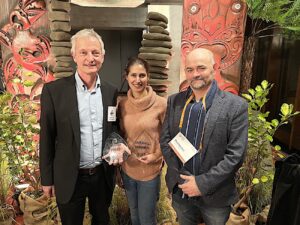 New Zealand faces a polycrisis due to decades of under-investment in public infrastructure. Indicative of this malaise are multiple failing infrastructures, over-stretched health services, decaying school buildings and unsafe civic spaces throughout the country. Stopping the rot will require raising our ambition as a nation and improving productivity through a higher value economy.
New Zealand faces a polycrisis due to decades of under-investment in public infrastructure. Indicative of this malaise are multiple failing infrastructures, over-stretched health services, decaying school buildings and unsafe civic spaces throughout the country. Stopping the rot will require raising our ambition as a nation and improving productivity through a higher value economy.
For too long our economic performance has been linked to an over-dependence on relatively low value commodities and tourism. As part of its quickfire raffle of “first 100 days” opportunities, the government is looking to “deliberately disrupt the system” by fast tracking gold mines, open-cast coal mining, property developments and bigger dairy farms, to name a few. Unfortunately these kinds of projects mostly lock us into even greater dependence on low value commodity based industries that do not generate the returns required to substantially lift productivity. But doesn’t this help us improve our gross domestic product (GDP)? Yes it does, but the benefits are not shared equitably, with returns often heading directly offshore.
Multi-factor productivity (MFP), on the other hand, represents residual economic growth due to factors (other than labour or capital) such as technological advancements, improved management practices, and a better-skilled workforce. MFP illustrates how successful a nation is at innovating and transforming resources into high value outputs. Over the last two decades or so New Zealand performed terribly compared to other OECD nations on this measure. Arguably, MFP is also the slice of the economic pie that allows governments to steadily improve the quality of public services and investment, as real wealth increases and tax receipts grow. Clearly we are heading in the opposite direction at present.
Quidnet Ventures managing director Mark Bregman illustrated the situation in a recent article discussing the innovation gap. We need to move to an “abundance mindset” and get over our hangups such as misplaced nationalism and the current reluctance of research institutions to back science that has commercial potential, he asserts. Important because one of the keys to creating high value economic returns lies in homegrown research that has future commercial potential. But getting these projects off the ground has always been problematic for a number of reasons, including funding constraints, institutional bureaucracy and lack of entrepreneurial mindset. How we approach science commercialisation must change.
With the nebulus “Te Paerangi – Future Pathways” report now mercifully euthanised by the Science Minister a new plan for research, science and technology now needs to be found. This time a sensible discussion about commercialisation must be included. To this end, the freshly minted Science System Advisory Group and University Advisory Group have been tasked with delivering a new strategic plan for transforming the science and university sectors. This will include (yet another) review of the performance based research fund (PBRF), the contentious pot of public funding that tends to favour larger universities with greater output, rather than promoting innovation or supporting the most important areas of research for society.
But none of this will matter unless we eliminate the institutional and financial roadblocks that are preventing research getting out of the lab and into the commercial sphere. The current model is simply not working at sufficient scale or speed.
Like all good researchers, we are testing some hypotheses around disrupting the status quo and creating more value for entrepreneurial science researchers. Feedback is welcome. To find out more about GeniusReFi – please join us here.
Paul Spence is a commentator, researcher and a part-time university commerce and management lecturer. A previous co-founder of a successful New Zealand based global technology venture, co-founder and director of Creative Forest, principal at GeniusNet Research & GeniusReFi and a startup advisor. You can follow Paul on Twitter/X @GeniusNet or sign up for a free weekly digest of startup, tech and innovation related events co-curated by him through New Zealand Startup Digest.
Image credit: Renea Mackie
Data source: Figure NZ under Creative Commons Licence 4.0




 This year has been remarkable if for no other reason than the pandemic has resurfaced some ugly divisions that continue to bubble away behind the easy-going facade of New Zealand society. We are doubtless challenged now more than ever on numerous complex topics, including environment, poverty, crime, health, immigration and race. So the need for change is absolutely genuine. But the manner in which change is now being enacted is both contemptuous and potentially self-defeating.
This year has been remarkable if for no other reason than the pandemic has resurfaced some ugly divisions that continue to bubble away behind the easy-going facade of New Zealand society. We are doubtless challenged now more than ever on numerous complex topics, including environment, poverty, crime, health, immigration and race. So the need for change is absolutely genuine. But the manner in which change is now being enacted is both contemptuous and potentially self-defeating.

